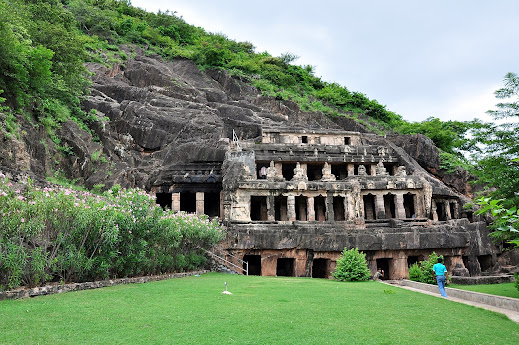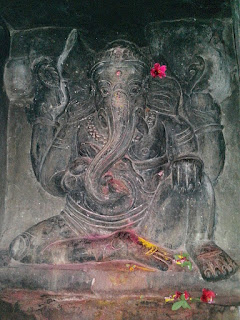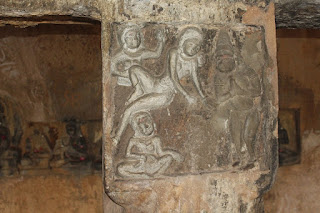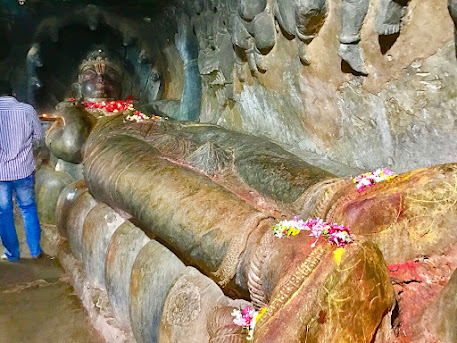தமிழில் விஷ்ணுவின் அவதாரங்க்ள், புராணங்கள் அதிகமாக சொல்லப்படும் பரிபாடல் காலம் பொஆ.7ம் நூற்றாண்டு என்பது அறிஞர் முடிபு, அதற்கு முன்பே பள்ளி கொண்ட பெருமாள், நரசிம்மர், பிள்ளையார், ஹனுமான் சிற்பங்கள் கொண்ட ஆந்திராவின் உண்டவல்லி குகைக் கோவில்- பொஆ.4முதல் 5ஆம் நூற்றாண்டைச் சார்ந்த குடைவரைகள் உள்ளன
https://en.wikipedia.org/wiki/Undavalli_Caves
உண்டவல்லி என்பது இந்தியாவில் ஆந்திரா மாநிலம் குண்டூர் மாவட்டத்தில் கிருஷ்ணா ஆற்றங்கரையில் அமைந்துள்ள ஒரு சிற்றூர். இங்கு பொஆ.4முதல் 5- ஆம் நூற்றாண்டைச் சார்ந்த குடைவரைகள் உள்ளன. இக்குடைவரைக் கோயில் 4 தளங்களை உடையது. அடித்தளம் முற்றுப்பெறாத நிலையில் காணப்படுகிறது. கூரைகளைத் தூண்கள் தாங்குமாறு குடையப்பட்டுள்ளன. அடித்தளத்தின் மண்டபம் ஏழு தலைவாயில்களைக் கொண்டுள்ளது.

The Undavalli Caves, a monolithic example of Indian rock-cut architecture and one of the finest testimonials to ancient viswakarma sthapathis, are located in Mangalagiri Tadepalle Municipal Corporation of Guntur district in the Indian state of Andhra Pradesh. The caves are located 6 km south west from Vijayawada, 22 km north east of Guntur City of Andhra Pradesh. It is one of the centrally protected monuments of national importance.
History: These caves are carved in Gupta style of rock-cut Architecture which goes back to 4th-5th century CE. Most of emperor of Gupta's were Vaishnavas so we can see many sculpture of Narasimha, Vishnu and Ramayans stories. They are associated with the Vishnukundina kings of 420-620 CE. These caves are dedicated to Anantha Padmanabha and Narashimha.
Later Jain and Buddhist monks used these as rest houses.
Chronology
These caves were carved out of solid sandstone on a hillside in the 4th to 5th centuries CE. There are several caves and the best known largest one has four stories with a huge recreated statue of Vishnu in a reclining posture, sculpted from a single block of granite inside the second floor. It was originally a Hindu cave resembling the architecture of Udayagiri and Khandagiri. It is estimated that these caves were sculpted sometime in 4-5th century CE during the reign of Vishnukundina kings. The main cave is one of the earliest examples of Gupta architecture, primarily primitive rock-cut monastery cells carved into the sandstone hills. Initially, the caves were shaped as a Jain abode and the first-floor abode still retains the Jain style; the vihara exhibits Jain monastics and includes tirthankara sculptures. This first level of the cave is a carved vihara and includes Buddhist artwork. The site served as the Bhikkhu monastic complex during ancient period. The walls of the caves display sculptures carved by skilled craftsmen.
The caves are surrounded by green countryside. From the high hill above the cave overlooking the Krishna River many fine specimens of rock-cut architecture can be seen. These caves are part of Mangalagiri Tadepalle Municipal Corporation.
Architecture: It is an Impressive Four storey rock cut temple with East facing facade of 29m long, 16m wide. There are variation in depth of each floor. The ground floor is an unfinished low pillared hall with 8 pillars and 7 door openings on façade. The first storey accommodates triple shrine at back, each with the pillared hall in front, originally dedicated to the Trinity (Siva, Vishnu, and Brahma).
Sculptures on the walls represent Vaishnava deities. The second storey has a pillared rectangular shrine of Vishnu on a serpent. Sculptures of Shiva and Vaishnava and a few like the Vaishnava Alwars are sculptured later on. The top floor was unfinished with a Triple Shrine. Some of the sculptural specimens are attributed to Chalukyan period. It has 5 meter long statue of Vishnu in reclining position. However, it may be difficult to conclude that the 5 meter long statue is lord Vishnu, because well accepted position of lord Vishnu are one side aligned, closed eyes, four hands, 5 head serpent with female god Shre Devi and Bhudevi. There is no such similarity. So it can be concluded that the statue may be 23rd or 17th tirthankara of jainism Parshvanatha. More particularly, the 8 head serpent in the cave leading to a new topic of research in the respective field.
குகைக்குள் குடிகொண்டருளும் அனந்த பத்மநாப ஸ்வாமி
உண்டவல்லி, குண்டூர் மாவட்டம், ஆந்திர பிரதேசம்
உளியால் செதுக்கிய உயர்ந்த கலை வடிவம் ‘உண்டவல்லி’ குகைகள். இங்கு ஆனந்தமாக சயனத் திருக்கோலத்தில் காட்சி தருகிறார் அனந்த பத்பநாப சுவாமி. உண்டவல்லி என்பது ஆந்திர பிரதேசம் குண்டூர் மாவட்டம் தாடேபல்லி மண்டலத்தைச் சேர்ந்த ஒரு கிராமம்.


அமராவதியின்சுற்றுப்புறத்தில் உள்ள 29 கிராமங்களில் ஒன்று. இங்கு ஒரு மலைத்தொடரின் முன் பாகத்திலிருந்து உட்புறமாக துளைத்துக் கொண்டே சென்று நான்கடுக்கு அற்புதங்களை படைத்துள்ளார்கள். இவற்றில் குடைவரைக் கோயில்களும் சிற்பங்களும் கண்ணைக் கவரும் சௌந்தர்யங்களை அள்ளி வீசுகின்றன
அனந்த பத்மநாப ஸ்வாமியும், நரசிம்மரும் இக்குகைக் கோயில்களில் கொலுவீற்றிருக்கும் பிரதான தெய்வங்கள்.இவற்றுள் ஒன்றில் ஒரே பாறையில் வடித்த 20 அடி ‘ஏக சிலை’ விக்கிரகமாக அனந்த பத்மநாபசாமி காட்சி தந்து பார்ப்போர் கண்களையும் மனதையும் கவர்கிறார். அவற்றோடு பிரம்மா, விஷ்ணு, மகேஸ்வர் ஆகிய மும்மூர்த்திகளுக்கும் இக்குகைகளில் குடைவரைக் கோயில்கள் உள்ளன.

 இங்குள்ள சிற்பக் கலை நுட்பங்கள் அஜந்தா, எல்லோரா சிற்பங்கள் நினைவூட்டுகின்றன. இவை குப்தர் காலத்தின் முதல் பகுதியை சேர்ந்த கட்டிடக்கலை ஆதாரங்களுள் ஒன்றாக கருதப்படுகிறது. இந்த குடைவரைக் கோயில்கள் கி.பி 420 இலிருந்து 620 வரை அரசாண்ட ‘விஷ்ணுகுண்டினர்’ என்ற அரசர்களின் காலத்தைச் சேர்ந்தவை.
இங்குள்ள சிற்பக் கலை நுட்பங்கள் அஜந்தா, எல்லோரா சிற்பங்கள் நினைவூட்டுகின்றன. இவை குப்தர் காலத்தின் முதல் பகுதியை சேர்ந்த கட்டிடக்கலை ஆதாரங்களுள் ஒன்றாக கருதப்படுகிறது. இந்த குடைவரைக் கோயில்கள் கி.பி 420 இலிருந்து 620 வரை அரசாண்ட ‘விஷ்ணுகுண்டினர்’ என்ற அரசர்களின் காலத்தைச் சேர்ந்தவை.
 இந்த குகைகள் புத்த விஹாரங்களைப் போல வெளியிலிருந்து தோற்றம் தந்தாலும், குடைவரை கோயில்களாக ஆந்திரப் பிரதேசத்தில் பெரும் புகழ்பெற்று விளங்குகின்றன. இது பௌத்த, ஹிந்து சிற்பக் கலைகளின் சங்கமமாக காட்சி தருகிறது.இந்த குடைவரை கோயிலில் ஒவ்வொன்றிலும் என்ன உள்ளது என்று பார்ப்போமா?
இந்த குகைகள் புத்த விஹாரங்களைப் போல வெளியிலிருந்து தோற்றம் தந்தாலும், குடைவரை கோயில்களாக ஆந்திரப் பிரதேசத்தில் பெரும் புகழ்பெற்று விளங்குகின்றன. இது பௌத்த, ஹிந்து சிற்பக் கலைகளின் சங்கமமாக காட்சி தருகிறது.இந்த குடைவரை கோயிலில் ஒவ்வொன்றிலும் என்ன உள்ளது என்று பார்ப்போமா? முதல் மாடியில் நரசிம்மர், விக்னேஸ்வரர், தத்தாத்திரேயர் மற்றும் சில சிலைகள் செதுக்கப்பட்டுள்ளன. ரிஷிகள், சிங்கங்கள் போன்ற சிலைகளும் உள்ளன. தூண்களின் மீது கூட சில சிற்பங்கள் காணப் படுகின்றன.இரண்டாம் மாடியில் சயன திருக்கோலத்தில் அனந்தபத்மநாப சுவாமி சேவை சாதிக்கின்றார். கர்பாலயத்தின் முகத்துவாரத்தில் ஜெய விஜயர்களின் சிலைகள் உள்ளன. அனந்த பத்மநாப ஸ்வாமி விக்ரஹம் நீளமாக பாம்பு படுக்கையோடு கூடியதாக உள்ளது. இவருடைய இந்த குகைக் கோயிலின் உட்புறம் தாமரையில் அமர்ந்துள்ள பிரம்மா, சப்த ரிஷிகள் மற்றும் பல தெய்வச் சிலைகள் உள்ளன. மலையின் வெளியில் குகையின் மேற்புறத்தில் மிகப் பெரியவையாக செதுக்கப்பட்ட சப்தரிஷி சிலைகள் காணப்படுகின்றன.மூன்றாம் மாடியில் முழுமையடையாத ‘திரிகூட ஆலயம்’ உள்ளது. இதில் எந்தச் சிலையும் இல்லை. இந்த குகைக் கோயில்கள் நடு நடுவே உள்ள தூண்களோடும் அவற்றில் செதுக்கிய கொடிகள், குகைச் சுவர்களில் செதுக்கிய தெய்வச் சிற்பங்கள் ஆகியவற்றோடு மிக விசாலமாக காணப்படுகின்றன. ஒரே மலையை குகைகளாகவும் தெய்வச் சிலைகளாகவும்‘ஏக சிலை’ எனப்படும் ஒரே பாறையில் செதுக்கும் கட்டிடக்கலை நுட்பத்தோடு அமைத்துள்ள சிற்பிகளின் திறமையைக் கண்டு வியக்காமல் இருக்க முடியாது, குகைக் கோயில்களைச் சுற்றிலும் பசுமையான வயல்கள் கண்களுக்கு விருந்தளிக்கின்றன.இந்த குகைகளில் இருந்து சுரங்கப் பாதைகள்:-இந்த குடைவரை கோயில்களிலிருந்து தக்காணத்தை ஆண்ட ‘கொண்டவீடு’ அரசர்களின் கோட்டைக்கும், மங்களகிரி மலைக்கும், விஜயவாடா கனகதுர்கா கோவிலுக்கும் ரகசிய மார்க்கங்கள் இருந்ததாகத் தெரிகிறது. முன்பு இந்த பாதைகளைப் பயன்படுத்தி அரசர்கள், எதிரிகள் அறியாவண்ணம் தம் படைவீரர்களை போர்க்களங்களுக்கு அனுப்பினார்கள். தற்போது இந்தச் சுரங்கப் பாதைகள் பாழடைந்து மூடப்பட்டுள்ளன.உண்டவல்லி குகைக் கோயில்களை எவ்வாறு சென்றடைவது? உண்டவல்லி குகைக் கோயில்களுக்கு குண்டூரு, விஜயவாடா நகரங்களிலிருந்து சாலை மார்க்கம் உள்ளது. குண்டூரிலிருந்து முப்பது கிலோமீட்டர் தொலைவிலும், விஜயவாடாவில் இருந்து ஆறு கிலோமீட்டர் தொலைவிலும் உள்ளது.குண்டூரிலிருந்து தேசிய நெடுஞ்சாலை வழியே மங்களகிரி சென்று அங்கிருந்து மாநில நெடுஞ்சாலை வழியே உண்டவல்லி நாற்கூடலியை அடைந்து, அங்கிருந்து இடப்புறம் திரும்பி மூன்று கிலோமீட்டர் பயணம் செய்தால் உண்டவல்லி குகைகளை தரிசிக்க முடியும்.விஜயவாடாவிலிருந்து வருபவர்கள் பிரகாசம் பாரேஜைத் தாண்டிய பின், உண்டவல்லி நாற்கூடலியை அடைந்து வலதுபுறம் மூன்று கிலோமீட்டர் சென்றால் உண்டவல்லி குகைகளை அடையலாம்.காலை ஆறு முதல் மாலை ஐந்தரை மணி வரை யாத்திரிகர்களை அனுமதிக்கிறார்கள். பதினைந்து வயதுக்கு உட்பட்டவர்களுக்கு நுழைவுக் கட்டணம் இல்லை. கட்டாயம் சென்று தரிசித்து வருவோமா?











No comments:
Post a Comment